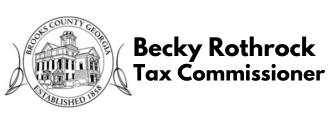
© Government Window, LLC.
All Rights Reserved.


What forms of payment do you accept?
Cash
Checks
Money Orders
Visa
MasterCard
Discover
American Express
Note: A convenience fee is added for credit/debit transaction
When does my registration expire?
Motor Vehicle tag renewals are due on the owner's birthday. If you were a
resident of Brooks County last year and renewed your tag in Brooks County
last year, then you should receive a bill 60 days prior to your birthday in the
mail. If you did not, bring your registration with tag number to the Tax
Commissioner's Office.
BUSINESS REGISTRATIONS
Registration is issued for all vehicles with less than 26,001 pounds gross vehicle weight by
the first letter of the business name and are due on the last day of that coordinating month.
| JANUARY- A &B | JULY - M & N |
| FEBRUARY - C & D | AUGUST - O & P |
| MARCH - E & F | SEPTEMBER - Q & R |
| APRIL - G & H | OCTOBER - S & T |
| MAY - I & J | NOVEMBER - U & V & W |
| JUNE - K & L | DECEMBER - X & Y & Z |
What do I need when I come into the office to renew my vehicle
registrations?
For vehicles weighing over 55,000 lbs. you will need an updated 2290
before you can renew your vehicle.
Is there a penalty if my registration is late?
Yes. 25% is added to your Tag Fee; 10% is add to yourAd Valorem Tax.
I'm unable to appear in person to renew my registration, what are my options?
I purchased a vehicle from a private owner; what must I present to register the vehicle?
How much should I expect to pay for my initial registration?
How much does it cost to replace a lost or stolen plate/decal?
Replacement Plate or Decal - $8.00
How much does it cost to replace a lost title?
$8.00
I received notification regarding a lapse in insurance coverage, what should I do?
Restitution can be made at your local tag office.
What is the last day I can apply for homestead exemption?
Although applications may be submitted at any time, the deadline for the
current billing year is April 1 with the Tax assessors office at 229-263-7920
Becky P. Rothrock
Tax Commissioner
Main Office
610 S. Highland Rd
Quitman, GA 31643
Click here for map >
Phone
(229) 263-4586
Fax
(229) 263-9020
Email
brothrock@brookscountytax.com
|
Danielle Priest
Chief Deputy Tax Commissioner dmp@brookscountytax.com |
|
Stephanie Adams
Tax and Tag Clerk sjadams@brookscountytax.com |
|
Lorissa Rodriguez
Senior Tag Clerk ltr@brookscountytax.com |
|
Amanda Collins
Senior Tax Clerk amanda@brookscountytax.com |
|
Chiquita Bacon
Tax and Tag Clerk cbacon@brookscountytax.com |
Monday – Friday
8:00am to 1pm &
2:30pm to 4:30pm
Hours are subject to change without notice.
GovtWindow Help
(877) 575-7233
support@governmentwindow.com